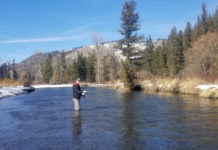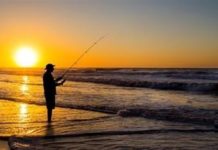Ireland claimed the recent Spring Home International fly-fishing championships on Lough Melvin in Co Fermanagh with a resounding win on the team front and individual category.
Against a strong field of anglers from Wales, Scotland and England, the Irish team took full advantage of home ground to claim victory with an overall team catch of 36 trout, including seven fish for Kilbride angler Denis Goulding to win the coveted Brown Bowl.
The championship was held under the auspices of the Home International Fly-Fishing Association and hosted this year (for the first time) by Garrison and Lough Melvin Anglers’ Association. It is standard practice for the event to rotate each year and Ireland also took the honours in 2018 on Lough Mask.
Following two practice days, the 14-strong teams took to the water in a strong south-westerly gusting to 40kph in search of the sonaghan and gillaroo trout, unique to Lough Melvin. Mayfly patterns were the order of the day which accounted for over 100 fish caught, measured and released.
An amusing incident related to Irish angler Nigel Greene who ‘left’ his wallet in a field close to the lakeside during the lunch break. Before darkness fell, along with Clare angler Seamus O’Loughlin, they decided to venture back in search of the wallet.
Upon arrival, to their surprise a bull was waiting close to the spot. Neither of the lads were prepared to take a chance to step from the boat so, after much deliberation, they returned to base empty-handed. A further search in Nigel’s car revealed the wallet. (A bit of a ‘cock and bull story’ but true nevertheless.)
Over dinner and presentation of prizes in the Great Northern Hotel, Bundoran, International President, Stan McKeon, said: “I would like to thank Garrison and Melvin Anglers’ Association for their wonderful welcome to all our home and overseas guests, and a special ‘thank you’ to Ireland team captain, Darren Maguire for his outstanding organisational skills to make the event such a great success.”
Results: 1, Ireland, 36 fish; 2, Scotland, 31f; 3, Wales, 21f; 4, England, 18f.
Pink salmon threat to Atlantic salmon stocks
At the recent North Atlantic Salmon Conservation Organisation (Nasco) meeting, serious concerns were raised that pink salmon may establish in rivers throughout the Atlantic region following an explosive growth in stocks in northernmost Norwegian rivers in 2021.
In some rivers pink salmon now appear to outnumber Atlantic salmon. Stocking programmes in adjacent rivers northwest of Russia since the 1950s until 2001 are believed to be responsible for the initial spread to the region.
Since 2017, the fish has been detected in unprecedented numbers in river systems and coastal areas of the North Atlantic, including Ireland, albeit at relatively lower levels.
Also known as humpback salmon, they are a migratory species, native to river systems in the northern Pacific Ocean, Bering Sea and Arctic Ocean.
Although a specimen was first recorded in Ireland in 1973, until 2017 individuals have been rarely encountered here. As pink salmon predominantly have a two-year lifecycle, there is potential for the species to reappear again in 2023 and every second so-called ‘odd’ year thereafter.
However, they can also turn up in ‘even’ years and a specimen was reported in the River Suir in 2018.
Nasco, of which Ireland is a participant under the auspices of the EU, has agreed to co-operate to better understand the threats posed to Atlantic salmon stocks and consider appropriate mitigation measures to address this increasingly concerning issue.
Francis O’Donnell, CEO of Inland Fisheries Ireland, said: “The threat of pink salmon means that our already critically endangered Atlantic salmon are on the verge of a very serious ecological crisis. The species is already under threat from declining water quality, loss of habitat, impacts of sea lice and salmon farm escapes on native stocks.”
Dr Cathal Gallagher, head of research and development at IFI, said: “Despite very limited information currently available to comprehensively assess such threats, climatic and environmental conditions in Ireland are considered amenable to facilitate the potential establishment of Pacific pink salmon populations in our river systems.”
Anyone who catches a pink salmon is asked to: a) Keep the fish and do not release it back into the water; b) Record date, location of capture, length and weight; c) Report it to any IFI office or hotline number (as below); d) Tag and present it to IFI and a new tag will be issued; e) Take a photograph of fish.
IFI will then arrange collection of the fish for further examination to help establish the abundance and extent of distribution of the species in Irish waters.
Anglers are asked to report catches of pink salmon to IFI’s 24-hour confidential hotline – 0818 34 74 24 or 0818 FISH 24. As these fish die after spawning, some dead specimens could also be encountered along Irish rivers.
Longford man fined for carrying out works on Aughnacliffe River
Mr Colm Ginty from Aughnacliffe, Co Longford was convicted and fined €1,000 and ordered to pay a further €1,727.91 towards costs and expenses at Longford District Court, following a prosecution taken by Inland Fisheries Ireland (IFI).
Judge Owens convicted Mr Ginty under Section 173(1)(d) Fisheries (Consolidation) Act 1959 for carrying out works on the Aughnacliffe River last June that involved removal of a substantial amount of gravel from the river channel causing destabilisation of the bank.
The court heard evidence from fisheries officer, Ailish Keane as to the adverse impact caused by the actions along the 90m section of river. Ms Keane also outlined the negative long-term impacts the works would have on the lifecycle of brown trout for years to come.
The Aughnacliffe River is a tributary of the Erne River catchment which contains excellent spawning habitat for wild brown trout.
IFI’s Milton Matthews, said: “It is a landowner’s responsibility to get in contact with their agricultural advisor or IFI before carrying out works in or along watercourses. Failure to do so may result in a damaging impact to fisheries habitat and may be liable to prosecution.”
If you have an angling story to share, please send to me at angling@irishtimes.com
Credit: Source link































